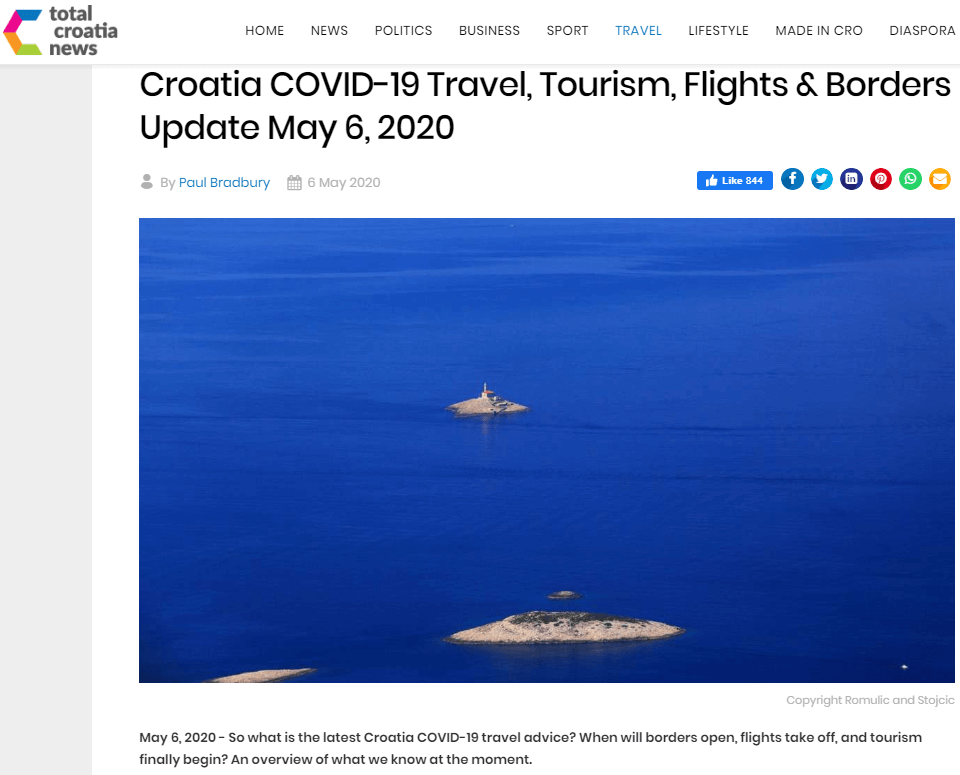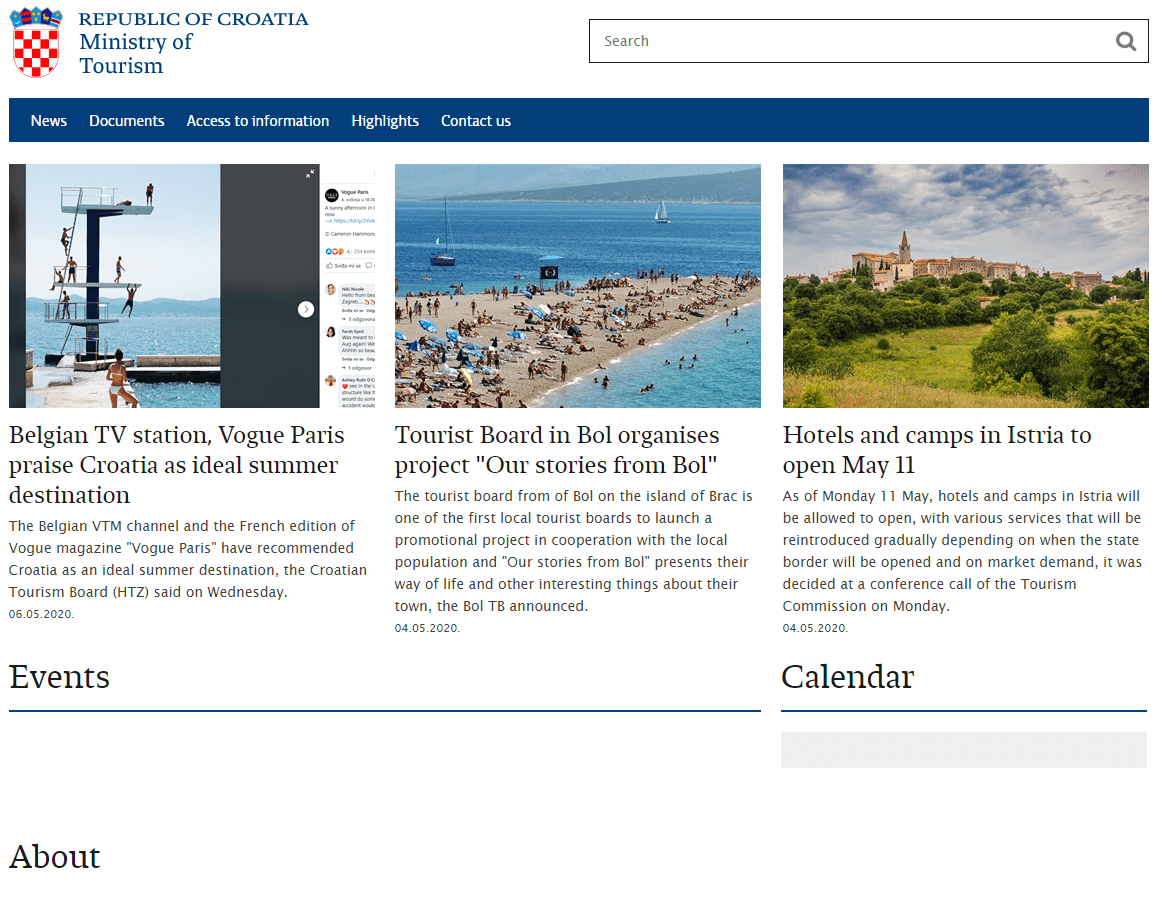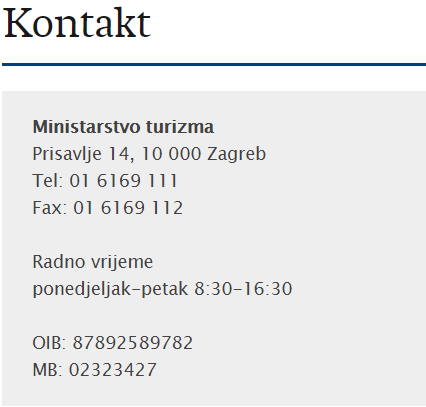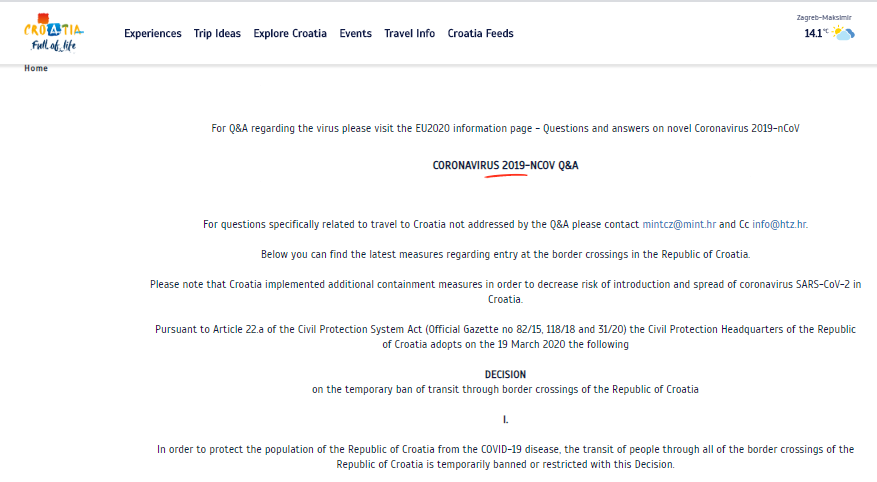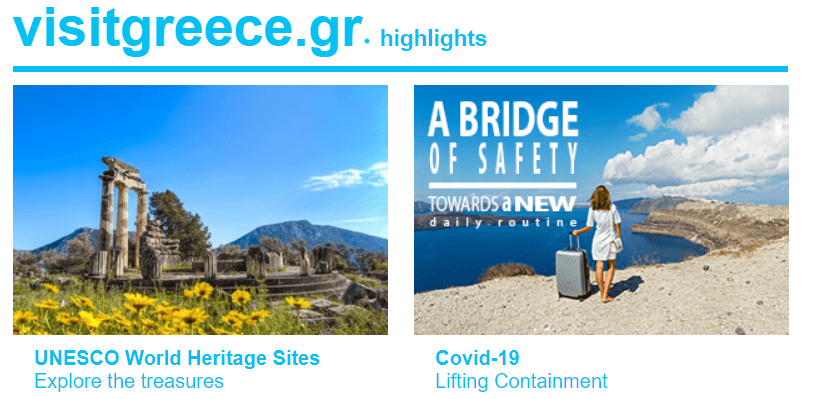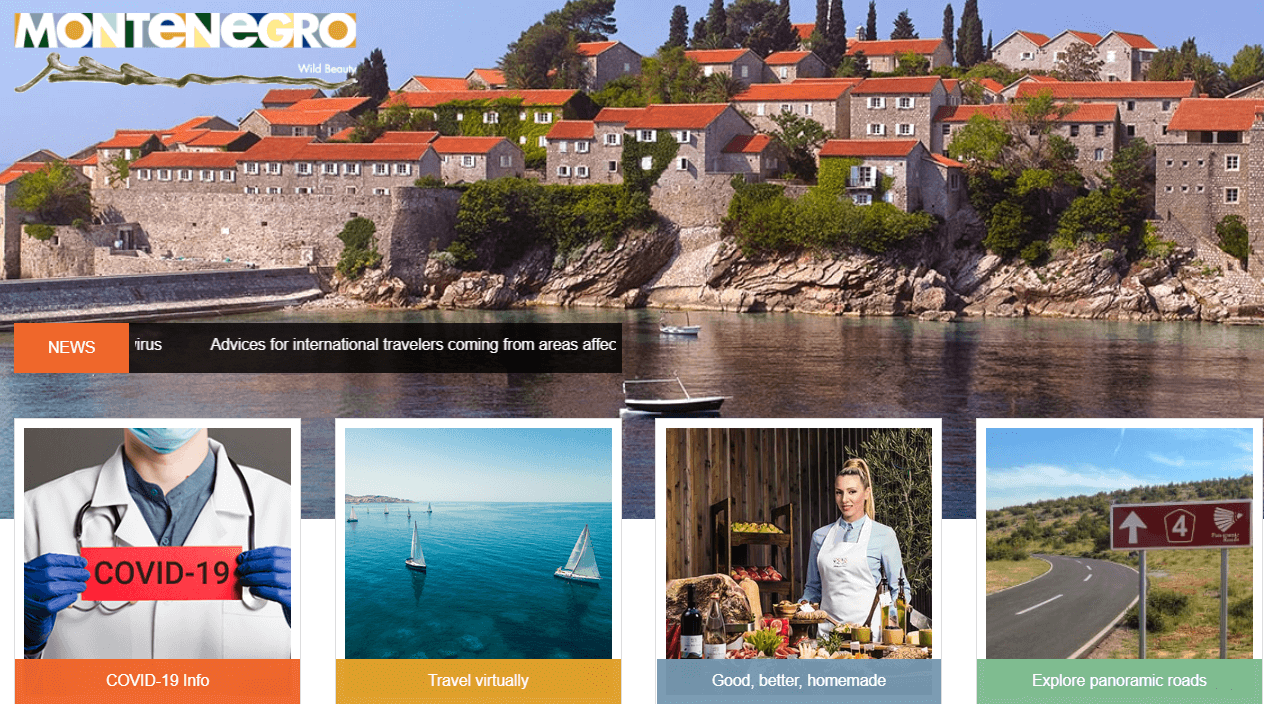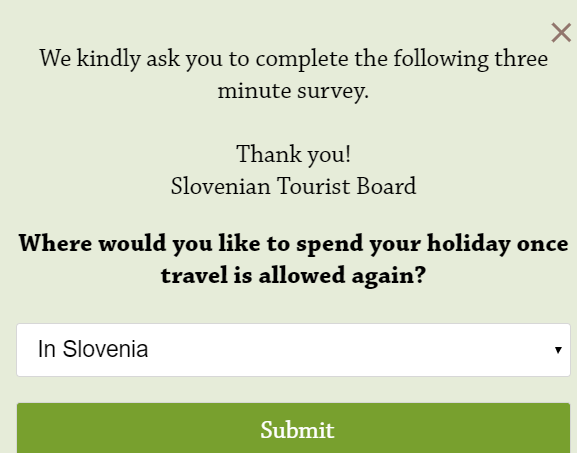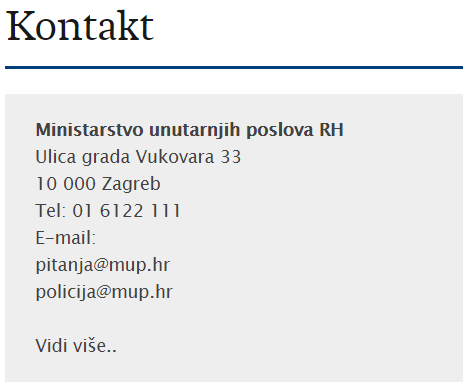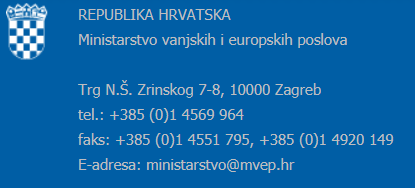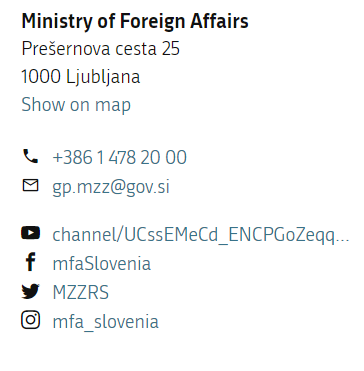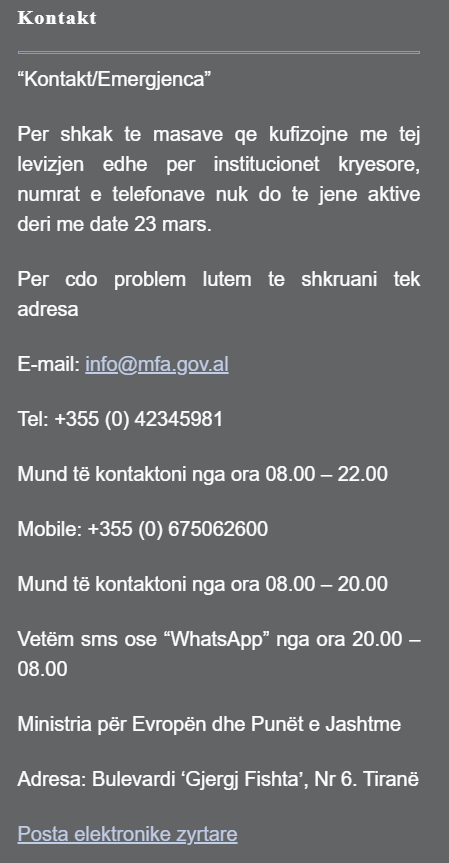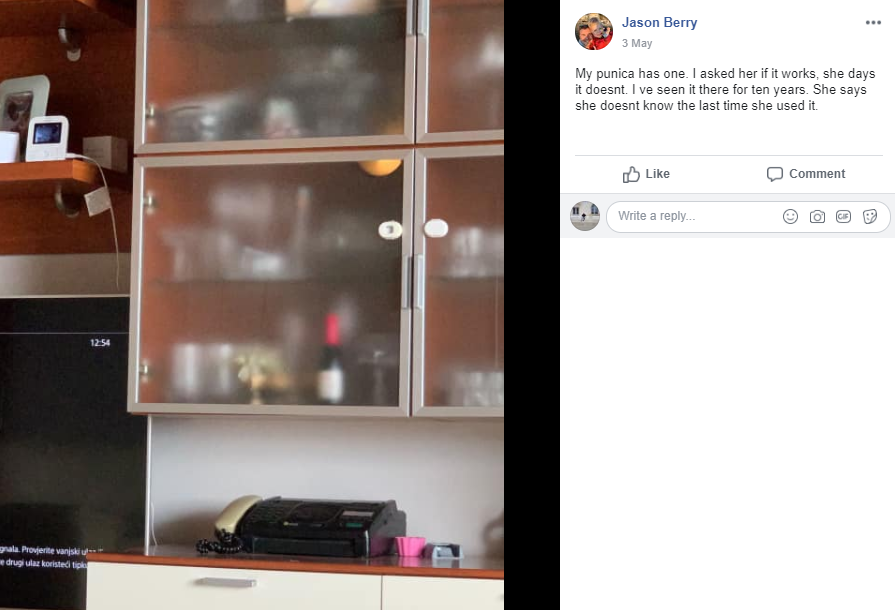EU Sends Strong Message to Western Balkan Countries from Zagreb Summit
ZAGREB, May 7, 2020 - The European Union sent from the Zagreb Summit on Wednesday a strong message to Western Balkan countries that they have an unequivocal European perspective and that their future is in the EU.
Leaders of the EU's 27 member states and six Western Balkan countries held a summit via video link because of the coronavirus pandemic.
"Although the meeting, unfortunately, was not held as would have liked, by physically coming together in Zagreb, in terms of content we have achieved results in line with our expectations and those of our south-eastern neighbours," Croatian Prime Minister Andrej Plenković one of the co-organisers of the summit, said at a press conference.
"I'm sure the peoples and states in our neighbourhood will appreciate the message that was sent today from Zagreb and all other capitals of the EU member states," he added.
"The European Union wants to continue to support the countries of Southeast Europe on their path to the EU. We wanted to send a message for the continuation of the Kosovo-Serbia dialogue. Croatia especially underlined that Bosnia and Herzegovina as its nearest neighbour deserves membership candidate status and that it should be helped in that. In that context, we underlined the issue of the equality of the constituent peoples in Bosnia and Herzegovina, notably the status of the Croatian people in terms of legitimate representation in the highest BiH institutions," Plenković said.
He pushed for holding such EU-Western Balkans summits every two years at least.
He said he was pleased the blockade of a decision to open accession negotiations with North Macedonia and Albania was lifted during Croatia's EU presidency.
Asked if some countries in the region should be more grateful to the EU and kiss the European flag instead of China's, as Serbian President Aleksandar Vučić did, Plenković said it was not up to him to talk on anyone's behalf but that all six Western Balkan countries had clearly articulated their European orientation.
European Commission President Ursula von der Leyen said the Western Balkans was an absolute priority for the EU and that this region belonged to the EU.
She underlined the importance of reforms, notably regarding freedom of the press, which she said was the cornerstone of the EU and the best instrument in the fight against disinformation.
European Council President Charles Michel underlined the importance of the Zagreb Declaration which once again reaffirmed the European perspective of Western Balkan countries.
He welcomed the €3.3 billion aid package which the EU set aside for them to deal with the effects of the coronavirus pandemic.
More news about Croatia and the EU can be found in the Politics section.
Meet Patricia Yeo, Celebrated Head Chef of Maslina Resort on Hvar
May 7, 2020 - Maslina Resort is a five-star boutique hotel, slated to open this summer in Maslinica Bay on the island of Hvar, just minutes away from the UNESCO-protected Stari Grad.
As Maslina Resort gears up for its summer opening in Maslinica Bay on the island of Hvar, it is actively recruiting to craft the ideal team.
With a mission to honor the UNESCO-protected Mediterranean diet on the island, the Wine & Dine department at Maslina Resort is of crucial importance - and perhaps the most prominent character to the puzzle is pronouncing the perfect chef - Patricia Yeo.
By fusing elements of an international upbringing that took her from Malaysia to England to the United States, with a precision that she honed as a trained scientist, Patricia Yeo has been celebrated for her unique cuisine ever since her first restaurant, AZ, opened in 1999. The favorite of The New York Times also received two Michelin stars in 2002.
But the accolades didn’t stop here. After AZ, Yeo received three New York Times stars for a Mediterranean concept Pazo in 2004, and in 2008, two New York Times stars for a French-Vietnamese restaurant Sapa, all while consulting and launching projects in Boston.
After over twenty years in fine dining in Manhattan, Yeo explored a more corporate role in national and international restaurant groups, and her culinary prowess was pivotal in restaurants within hotels in Las Vegas, the Caribbean, London and Singapore. Hooked by the luxury travel bug, Yeo roamed to remote and exotic locations around the world, from stints in Oman and Turkey with Six Senses to Shina Mani Wild in the jungles of Cambodia while overseeing food and beverage services at Shinta Mani and Treeline in Siem Reap.
Promising to balance traditional and innovative techniques, and local and international culinary styles, Patricia Yeo is the ideal candidate to lead the culinary team at Maslina Resort. TCN met up with Patricia to learn more about her role in the new luxury resort.

Nataly Lee
First, tell us a bit about yourself and how you came to being head chef at Maslina Resort?
I am culturally confused; I'm of Chinese ancestry born in Malaysia, raised in the UK and the US. I’ve also lived for extended periods in five other countries. All this traveling is a real advantage culinarily.
I was browsing LinkedIn and saw a post for the chef position at Maslina, I usually would not respond, but on a lark, I sent Zoran a note, he responded in 2 hours, and two weeks later I was moving to Croatia.
How would you explain your culinary philosophy?
I think my food is very much ingredient-based. Use the best ingredients and treat them with respect. This means using meats that are ethically grown and killed humanely, using the whole animal not just the prime cuts, fish that is locally and preferably line caught (i.e., not trawled with large nets which catch fish indiscriminately trapping young breeding fish interrupting the live cycle), produce that is locally grown and in season. This means I do a lot of preserving, whether it is pickling, curing, jamming, dehydrating. It allows me to use cherries in December because I brandied it in June.
How will this philosophy integrate into the cuisine at Maslina Resort?
Part of the reason I am so excited to be at Maslina, is because it is a prolific growing region with a great variety of fish and game. I have gone foraging with a local lady who is an ethnobotanist, and there are so many wild plants and herbs that are edible. Having the ability to use local, foraged ingredients is such a treat. I can’t wait for the mushroom season this fall. As someone who is inspired by ingredients I am in heaven, nothing inspires and excites more than picking perfect kumquats from a fruit-laden bush or watching figs ripen on a tree down the street. Really, everywhere one walks on Hvar, there are sights and smells that inspire, rosemary, pine, wild sage, briny sea breeze, lemon blossom. It is fabulous.
How will you implement local producers and suppliers?
We are fortunate at Maslina to have a great organic garden that is in a sheltered bay with lots of light, water, and well protected from the winds. Mario, our fabulous head gardener, will be able to grow a lot of herbs and soft greens for the kitchen. We are also going to work with a number of farmers from the Stari Grad Plains, and in some cases, they will grow specialty products for us and in others, we will simply use what they normally grow. We have made really good contacts from local goat cheese producers to beekeepers for honey and wax to fishermen. Because of the style of the menu (which will change daily, we are able to work with whatever ingredient they bring us. It is a more organic way of cooking, letting the ingredients dictate what we cook rather than having a menu dictate the ingredients we use. It is also a lot more fun.

Nataly Lee
What would you name as the key differences between working in a hotel or resort and a standalone restaurant?
The main difference is not the work in the kitchen, by that, I mean the cooking and production of good food are the same in both cases. The difference is the financial aspect of the business. As a chef of a standalone restaurant (especially if you are also the owner), there is a constant worry about making enough to pay the bills. In a resort or hotel, one of the most expensive fixed cost is eliminated. Rent usually takes up as much as 40% of a restaurant’s revenue, so with not paying rent, you are already ahead of the game.
From a Food & Beverage perspective, what is required to operate in a luxury resort?
Producing good food, whether it is in a luxury resort, a fine dining restaurant or even in your home kitchen, is the same, I think. You need to care about what you are doing; you need to be flexible and adapt to the needs and desires of your guest, you need to create a great environment for your guests to enjoy the meal. Luxury means different things to different people. Luxury, for me, means having a choice, be it caviar and champagne or a grilled cheese sandwich. Our goal is to provide this choice.
Has the island of Hvar and Croatia been able to provide everything you need so far?
It has been fabulous, not just in terms of cuisine but also in terms of a wonderfully beautiful place to live. The people in Stari Grad have been so warm and welcoming. They are so willing to share recipes, cooking techniques, local knowledge of ingredients.
What are you looking forward to most about running the kitchen at Maslina Resort? And about being in Croatia?
One of the first things I am going to do once I can get into the kitchen at Maslina is cooking for my co-workers, who have become my family in Croatia. There is nothing better than cooking for the people you love.

Nataly Lee
To read more about travel in Croatia, follow TCN's dedicated page.
HTZ: Belgian TV and Paris Vogue Recommend Croatia for Summer
May 7, 2020 - Belgium VTM television and Paris-based fashion magazine Vogue have recommended Croatia as an ideal summer destination.
The Croatian National Tourist Board (HTZ) reports that one of the most-watched commercial Belgian television companies, VTM, published a two-minute bit in Tuesday evening's news highlighting Croatia as a "corona free" destination.
The video states that some countries, such as Croatia, Greece and Portugal, have an excellent situation related to the coronavirus pandemic, which was accompanied by images of the Croatian coast and islands from the latest Croatian National Tourist Board communication concept #CroatiaLongDistanceLove.
"Former Belgian Genk footballer Frane Bućan commented on the current situation in our country for Belgian television, pointing out that Croatia organized excellent defense against the coronavirus and that Croats were extremely disciplined in implementing all prescribed measures," said the director of the Croatian National Tourist Board Office in Belgium, Ivan Novak.
They also point out that the well-known fashion magazine, Paris Vogue, published a photo of the diving board at the Kolovare swimming pool in Zadar on its Facebook profile, which is followed by more than five million people, with the description "a sunny afternoon in Croatia sounds ideal". The author of the photo is famed photographer Cameron Hammond, who described the creation of this idyllic photo as follows: “Many ask me if the scene was directed. My wife Rachel and I visited Zadar for the first time and watched the children jump into the sea for hours. Rachel went for a swim and stopped to get a better look at the diving board, and I just caught her with my camera."
Croatian National Tourist Board Director Kristjan Stanicic is satisfied with the recent announcements about Croatia in prestigious foreign media.
"Positive announcements greatly contribute to the image of our country as a safe destination and increase the visibility of Croatia on the tourist map of the world. We hope for the positive trends to continue, but also for the arrival of guests in our country when all the necessary conditions are met," said Stanicic.
The Croatian National Tourist Board reported this week that they had prepared four new videos for social networks on the topic of gastronomy, natural beauty, active tourism and culture, through which they continue to implement the new communication concept #CroatiaLongDistanceLove. The first video published on social networks was on the topic of natural beauties in Croatia.
The #CroatiaLongDistanceLove concept has so far been viewed by more than 1.5 million users, with the most views and comments in the markets of Germany, Italy, Austria, Slovakia, the Czech Republic and Slovenia.
The video has been viewed more than 40,000 times on YouTube, while the #CroatiaLongDistanceLove tag has been used more than a thousand times on Instagram.
The number of fans on 'Croatia Full of Life' channels has been growing in the last month. For example, in April alone, they reached almost four million people Instagram, more than nine thousand comments, 740,000 likes and more than 5,000 new fans, said the Croatian National Tourist Board.
To read more about travel in Croatia, follow TCN's dedicated page.
Beware the Croatian Inspector: 12. Do You Have The Money or Not?
May 7, 2020 - Beware the Croatian inspector - a new series courtesy of Glas Poduzetnika (Voice of Entrepreneurs), highlighting a Croatian business reality that helps kill growth, profit, and entrepreneurship. Do You Have The Money or Not?
I have seen them operating all over the country over the last 18 years, the most feared visitors to Croatia's cafes, restaurants, and other businesses - the Croatian inspector.
As with many corrupt countries, the role of the inspector should be to make sure that the rules are being adhered to in the particular area they specialize in - sanitary, fiscal, etc - but in reality, the prime motivation is to find ways to fill the State coffers and their own. Allegedly.
I heard SO many stories of inspections where perfectly run businesses end up paying thousands in fines, some of it justified, much of it grossly unfair. And there is an old truism here:
If the Croatian inspector comes to visit, he will find something, even if there is nothing there.
It is a subject that I have wanted to cover for years, but I never had quite the right material. Until now.
Huge thanks to those very proactive chaps at Glas Poduzetnika, who are really becoming a force for change to be reckoned with. A really great initiative. In one of their latest moves, they have been collecting some of their members' experiences with the Croatian inspector, to highlight the issue and the realities of doing business in Beautiful Croatia.
Story #12: Do You Have The Money or Not?
A warm greeting from Krapina, where everything seems picture perfect on a postcard while it's the worst possible environment for someone who is apolitical and trying only to work and get somewhere.
My experiences with inspectors are everything but pleasant, racket, and fictitious situations where inspector the lies in court and makes deals with the judge, punishing me with a big smile on their faces. It's been almost a month since my premise was sealed with the blessing of some local party feeder, even though I had a registered fast-food, pizza, and bakery activity.
However, they arbitrarily wrote on MTU (Bureau for Minimal Technical Conditions) that I would serve simple dishes. Hence, it's OK to write that too. During the greatest crisis, instead of helping you, they seal you up with no remorse, repeating the nonsense that this is not in their interests.
This is a recent situation. When I first opened, the inspector asked me, "Do you have money or not?" My staff just looked at each other. not believing what they just heard. Situation number two from the same inspector. "For this same reason, I punished Foodbar XXX, but I won't punish you because you are "hometown boys." And the fake profiles they look forward to barking from are a particular story.
Beware the Croatian Inspector is a new daily series (yes, there really is that much material) which you can follow here.
If you have a Croatian inspector story you would like to share with the Glas Poduzetnika team (in English or Croatian), you can do so via This email address is being protected from spambots. You need JavaScript enabled to view it. Subject TCN inspector.
You can follow the 55,000+ others on the Glas Poduzetnika Facebook page.
Does Croatia Actually Want Tourists? How the Competition is Updating Visitors
May 7, 2020 - Competition for post-corona tourists is going to be fierce. A look at how tourism countries are updating visitors on the latest travel situation so that they can play their trip. Oh dear, Croatia.
I am getting 30-40 emails a day from people asking for information about their summer holiday to Croatia. When will the borders be open? Is Ultra happening? When will flights restart? There is, many of them claim, very little information out there about the current situation in English. This surprised me, as if ever Croatia needed to keep people updated about the current situation for tourists, it is now. Competition from a much-reduced number of tourists is going to be insane when tourism starts up again, and Croatia needs to make it as easy as possible for potential visitors. At least in my opinion.
During the corona crisis, TCN has been putting together regular travel updates with all the things we can find in various places - the HAK updates on border closures, Jadrolinija ferry info, that kind of thing, as well as links to TCN articles on discussions of tourism starting again. This is the last one we did yesterday, and we will do a big update on May 11, when more restrictions will be lifted, including the resumption of internal flights. You can see the latest update here, and I would kindly ask people to read this rather than asking me when their flight will resume. I have included an airline by airline update on their plans, with links to the relevant page on the airline website.
With so many people contacting me due to lack of information elsewhere, I was curious to see what our official tourism heroes were doing to inform potential visitors about the current situation. And how did that compare with the compeition?
Here is what I found. Please make sure you are seated.
The lights are out at the Ministry of Tourism home page in English. There doesn't seem to be a corona crisis. There is nothing happening, and the calendar is empty. The good news is that Vogue Paris and Belgian TV think Croatia is pretty cool, the chaps at the Bol Tourist Board are making some videos stories, and hotels and campsites are opening in Istria next week. Can we visit Croatia? When will flights start? Who needs to share that kind of information. We are only the Ministry of Tourism homepage.
The Croatia homepage of the ministry website has more information - and some real gems. Here is the quick contact box for those of you who want to find out what is happening. No email contact, but why not send a fax? A nice, modern means of communication from a tourism country in 2020 which currently holds the Presidency of the EU. You can learn more about the fax obsessions of Uhljebistan in An Ode to the Fax, Digital Champion of Uhljebistan 2.0.
I contacted the Croatian National Tourist Board to ask where they send people for the latest travel advice. As I have said previously, although I do not agree with much that the national tourist board does, they are the most responsive Croatian institution I deal with, and their reply was swift. They had a dedicated page of travel information, which was linked to a COVID-19 banner on the homepage.
This is the start of it.
You can see the full advice here.
The advice begins by telling you to check something called the EU2020 page, but there is no link, so how are tourists supposed to find it?
The second piece of advice is to send an email (not a fax) to the ministry to ask them what is happening. Given that the coronavirus seems not to be happening according to the ministry website, one can only wonder what the response time might be.
But let's continue with the travel advice from the national tourist board. It is a thrilling read.
"Pursuant to Article 22.a of the Civil Protection System Act (Official Gazette no 82/15, 118/18 and 31/20) the Civil Protection Headquarters of the Republic of Croatia adopts on the 19 March 2020 the following."
What the hell does that mean? I just want to know when I might be able to sit on a beach in Croatia, not read up on sub-sections of an official gazette.
This is not some random blog, this is the official attention-grabbing page for a country where tourism makes up 20% of GDP, and our official advice for updating visitors talks about Article 22.a of the Civil Protection System Act (Official Gazette no 82/15, 118/18 and 31/20).
Where do I book my plane ticket?
With the Kings of Accidental Tourism on fire, how can the competition possibly compete, and what are they doing to try and match Croatia's innovative approach to updating visitors?
Meanwhile, in Greece, the homepage takes you to this FANTASTIC update, including a PDF document detailing all the measures for the easing of restrictions. Gold star and a chocolate biscuit to Greece.
The Italian Tourist Board is going to have to work hard to get tourists after the corona stigma. And it is. More gold stars and chocolate biscuits.
And congratulations to Serbia. Not only lots of prominent info.
But also links to applications and hotlines.
And over the border in Slovenia, I actually think they care about getting tourists, and they have even invested in the concept of being responsive to their needs, with a detailed optional survey on the homepage.
Meanwhile, in the Kingdom of Accidental Tourism, it is business as usual.
For the latest on Croatian tourism, follow the TCN travel section.
For the latest on COVID-19 in Croatia, check out the TCN daily update, as well as the dedicated coronavirus section.
Would Owner of Croatian Marinas Purchase Stake in Italian Football League?
Could the owner of multiple Croatian marinas become the owner of a stake in the currently enfeebled Italian football league? Although involved parties have denied to comment, unofficial allegations have surfaced.
As Poslovni Dnevnik/Tomislav Pili writes on the 6th of May, 2020, two major investment companies, CVC Capital Partners and Blackstone, are in separate negotiations to purchase a stake in the Italian Serie A football league, which is facing huge financial losses due to the coronavirus pandemic.
CVC has a long history of investing in sport, and as such, it was once the owner of a share in the famous Formula 1, then motorcycle races for the Grand Prix and in the English first rugby league. Here in Croatia, however, it is best known as the former owner of Zagrebačka pivovara (Zagreb brewery) and the current owner of Croatian marinas purchased from the large Turkish Dogus Group.
According to the Financial Times, CVC is in negotiations to purchase a 20 percent stake in the aforementioned Italian Serie A for a price of two billion euros, which would see the entire Italian first football league come at a value of 10 billion euros. According to informed sources, negotiations initially began late last year.
If it manages to reach that stake, it would give the owner of multiple Croatian marinas the opportunity to participate in negotiations to sell television rights to broadcast matches for a ten year period, more precisely from the year 2021 to the year 2031. Blackstone, on the other hand, wants to acquire a stake by now lending money to Italian clubs so they can cover their costs during the championship postponement.
However, sources have pointed out that negotiations with both funds are still at an early stage and could yet face legal obstacles. CVC, Blackstone and Serie A declined to comment on media allegations. Consulting firm KPMG has estimated that Italy's first league could lose between 550 million and 650 mllion euros in revenue related to TV rights, sponsorships and tickets if the championship - abruptly suspended in early March owing to the coronavirus pandemic - is not played to its completion.
For now, the leadership of the Italian Football Federation has not yet agreed with the clubs whether or not the championship should continue. Last season, Serie A clubs shared 1.2 billion euros in TV rights revenue, which is 2 billion euros less than the English clubs in the Premiership, the most valuable national football competition in the world.
Back in 2018, the Italian league sold the rights to television broadcasts until 2021 to the pay-TV house Sky and the internet streaming service DAZN. However, the suspension of the championship owing to the pandemic has raised tensions between Serie A and Sky and DAZN, who are demanding a lower amount for this year's rights due to the suspension of those matches.
For more on business in Croatia, Croatian marinas and more, follow this page.
Sudamja 2020: Split Celebrates City Day and Sv. Duje
May 7, 2020 - The City of Split traditionally celebrates its patron saint, Sv. Duje, on May 7.
Split City Day is here, when the citizens honor and celebrate Split’s protector - Sv. Duje.
But who is Sv. Duje, anyway?
Also known as Saint Domnius, Saint Dujam, Saint Duje, Saint Domnio, Saint Doimus, or Saint Domninus, our Sv. Duje was born in today's Syria and was an early Christian bishop of the Roman city of Salona, the capital of the Roman province Dalmatia. Emperor Diocletian ordered Duje’s arrest in AD304, and he was executed along with other martyrs in Salona's amphitheater. Buried outside of the city walls, his grave became a place of worship.
While one might find it ironic that our Duje is the protector of the town founded by the emperor who executed him, it is perhaps even more peculiar that Emperor Diocletian’s mausoleum was converted into the Sv. Duje Cathedral, which is regarded as the oldest Catholic cathedral in the world that remains in use in its original structure.
The Sv. Duje Cathedral stands proud in the heart of the Old Town, and it only makes sense that the City Day celebrations begin here, where the Croatian flag is raised on top of the cathedral's bell tower.
Religious or not, this act highlights the bond Split citizens share with Sv. Duje, as it represents an identification with the city's heritage.
Split’s City Day celebration is usually a grand affair named ‘Sudamja’, which gathers thousands of Split citizens in the city center on May 7. From fairs to concerts, fireworks to bingo, folklore dances to exhibitions and regattas - Sv. Duje is the celebration of all celebrations in this ancient Croatian city.
However, the highlight is the centuries-old procession, held on the morning of May 7. While Sv. Duje’s relics were once carried around the entire old town, today, the procession begins at Peristyle in front of the Cathedral and continues to the Riva, where Holy Mass is held.
This year, however, as the world is rattled by the corona crisis, a more modest Sv. Duje celebration awaits. While no gatherings of large groups are allowed, and we are still adhering to strict measures by the National Civil Protection Headquarters, this year, Sudamja is coming to our homes.
"The traditional festival on the occasion of the feast of Sv. Duje has for years awakened in us a spirit of togetherness and belonging. Guided by the message of the #TogetherInSplit campaign, together, many got involved in creating projects to give their fellow citizens a different celebration of City Day.
At 10 am on HRT, you can follow the Holy Mass from the Sv. Duje Cathedral, and in the afternoon, at 6:20 pm, enjoy the recording of the Petar Grašo concert in the empty Peristyle, which brings a touch of optimism, light and celebration, organized by the City of Split, the Split Tourist Board with partners Dalmatian Concert and OTP Bank.
The Sv. Duje balcony party has been organized by Fabrique pub with partners Apodos agency, photo studio Smile and the Split Tourist Board. From 5 pm to 8 pm, the moving stage will tour the neighborhoods of Split where Marko Pecotić Peco and his band will sing Dalmatian hits. Go out to your windows and balconies and send a video message of unity to the world on our City Day.
The Split City Museum, Croatian National Theater Split, KUD Jedinstvo, Music Youth of Split, Ethnographic Museum, Center for Culture and Lifelong Education Zlatna Vrata, Collegium Split through history and many others have also joined in on the virtual fun, and dedicated their publications to the importance of tradition to preserve the unity and identity of one city," says the Split Tourist Board.
For more information, visit the Facebook pages of the City of Split and the Split Tourist Board.
Happy Sv. Duje to all!
To read more about lifestyle in Croatia, follow TCN's dedicated page.
Carlsberg Croatia Creates Disinfectant to Combat Coronavirus Pandemic
As Poslovni Dnevnik/Darko Bicak writes on the 6th of May, 2020, Carlsberg Croatia has recently joined the trend of more and more companies starting to produce disinfectants and protective agents in order to combat the ongoing coronavirus pandemic.
Namely, the brewery in Koprivnica processed 4,000 litres of fruit wine that was supposed to become a refreshing Somersby cider into hand sanitiser, called it Clean hands (Čiste ruke) and gave it to Carlsberg Croatia's employees to make them and their families even safer.
They donated the remaining amount to the local community, the City of Koprivnica, from which they directed the disinfectant where it is most needed. Tatjana Petričušić, Communications and Events Manager at Carlsberg, pointed out that difficult times require creative solutions:
"At the beginning of the pandemic in the brewery, we created the disinfectant in our own laboratory. However, as we don't have such raw materials and equipment to produce a larger quantity ourselves, we found partners and in cooperation with them, we produced our own disinfectant,'' explained Petričušić.
About 4,000 litres of fruit wine were processed into 70 percent alcohol through two distillation processes, and then disinfectant was produced, which was packaged in 1,200 half-litre bottles. This step, however, doesn't mean that the company plans to start a new business because they say that it is simply not profitable to produce disinfectant from fruit wine.
As Helle M. Petersen, President of the Management Board of Carlsberg Croatia, recently confirmed for Poslovni Dnevnik that the popular Somersby cider brand range is produced in Koprivnica and is exported to about twenty countries around the world, from Singapore to the USA. In the category of cider drinks, Somersby is the market leader here in Croatia, where it is offered in four out of a total of ten variants.
For more stories like this one, make sure to follow Made in Croatia.
Croatian Economy: Top in Terms of GDP Decline, Next in Terms of Growth Rate
As Poslovni Dnevnik/Jadranka Dozan writes on the 6th of May, 2020, as far as the Croatian economy is concerned, the European Commission (EC) predicts a GDP decline of 9.1 percent in 2020, but with a relatively quick start to recovery and 7.5 percent growth next year.
With the economic forecasts that come with the rolling around of spring, the European Commission recently presented the first official assessment of the consequences of the coronavirus pandemic on the European economy, and this year it is described as a "recession of historical proportions".
New forecasts compared to the winter forecasts of less than three months ago have clearly shown the extent of the economic shock caused by the coronavirus outbreak; As early as February the 13th, 2020, the EC's winter forecast for this year predicted a slowdown in European GDP growth to 1.2 percent, and in the spring, it turned into an expectation of a decline of 7.4 percent and then a recovery at a rate of 6.1 percent next year. year, which rests on assumptions that are nevertheless accompanied by numerous concerning uncertainties.
In the case of the Croatian economy, the European Commission's forecast for 2020 from mid-February has shifted from a 2.6 percent GDP growth forecast to a worrying 9.1 percent decline, but with a relatively quick start to economic recovery that should be reflected in growth of 7.5 percent in 2021, with domestic demand as the main driver of that growth.
The European Commission also predicts a higher rate of decline than that of Croatia this year in only three other Mediterranean countries - Greece (9.8 percent), and hard-hit Italy and Spain (9.4 percent). At the same time, next year, their predictions see the Croatian economy at the top in terms of growth in forecasts; when it comes to countries that the EC predicts will have better forecasts than Croatia in 2021, only Greece (7.9 percent) outdoes it. Compared to last week's projections, it turns out that the EC is somewhat more optimistic.
The Croatian Ministry of Finance's predictions of a slightly deeper decline this year (9.4 percent) and more moderate growth next year (6.1 percent) may still be explained by the Croatian Government's fresher and fuller insight into the state of the Croatian economy than that of the more distanced EC. And although these forecasts assume a gradual normalisation of life and work, the EC highlights the uncertainty factor of the duration of that desired and expected normalisation, as well as the very real risk of a potential second wave of the coronavirus epidemic.
Currently, the common denominator of the forecast for the Croatian economy remains the expectation of a relatively quick start to the recovery process. Whether it will take Croatia two, three or more years to reach last year's GDP level remains to be seen, but this time it is not expected that it will take a full decade, which is what the unfortunate situation looked like for the country after the devastating 2008 economic crisis.
Thus, in a review of Croatia's situation, EC analysts point out that the Croatian economy saw in the ''entrance'' of the coronavirus pandemic in a much better condition than it did with the 2008 crisis. This is especially true for macroeconomic and budgetary indicators. However, Zeljko Lovrincevic from the Zagreb Institute of Economics points out that at the same time, Croatia's demographic picture is far worse than it was back then, and the technological matrix has not changed significantly, which still makes the economy much more vulnerable.
Regarding the structure of the Croatian economy, the European Commission has emphasised Croatia's enormous level of reliance on tourism, which affects the depth of the expected decline this year, but also poses a risk in the case of longer travel restrictions.
"Due to the expected increased aversion to international travel of potential foreign tourists, tourism is not expected to recover to the level of 2019 in 2021," the forecasts say.
However, domestic demand should recover faster than exports do, as uncertainties about the outlook for global trade remain significant, and this year's export outlook is exacerbated by the recession(s) being experienced by Croatia's main foreign trade partners.
When it comes to household consumption, the Croatian Government's measures to (co)finance wages in the business sector should help preserve it. At the same time, projects financed from EU funds, as well as measures to support the liquidity of companies, should have a mitigating effect on the dynamics of investments, the European Commission pointed out.
The negative impact of the large decline in exports of goods and services on GDP should, in turn, be mitigated by the high import component of tourism exports.
"Unlike the Croatian Government's projections, in which the unemployment rate is falling very slowly according to today's values, the European Commission's projection instills optimism," commented Luka Burilovic, head of the Croatian Chamber of Commerce (HGK).
The Commission believes that the Croatian Government's measures to support wages and liquidity should mitigate the decline in employment, but despite this, employment will still fall sharply this year in sectors that are likely to experience disruptions for the longest time, such as the leisure, tourism and hospitality industry.
The unemployment rate, after last year's fall to a historic low (6.6 percent), could rise by about three and a half percentage points this year, according to the EC, to 10.2 percent, but the Commission expects it to fall again to 7.4 next year. Finally, the Commission has somewhat more favourable forecasts regarding the deficit. After three years of surplus, this year they see the general government deficit at 7.1 percent of GDP, and next year they calculate that it could be reduced to 2.2 percent.
The EC estimates that partial and complete write-offs of taxes and social security contributions for the hardest hit companies in the second quarter should reduce revenues by the projected 1.5% of GDP. They also calculate that, for example, subsidies for salaries in the private sector could cover more than half a million employees and cost almost 2 percent of GDP.
The decline in activity for the Croatian economy and the government measures to try to keep things afloat has resulted in a significant increase in financing needs, so the EC expects public debt to rise to 89 percent of GDP this year, with a decline to below 84 percent of GDP in 2021.
For more on the Croatian economy, follow our lifestyle page.
Oda faksu, digitalnom šampionu Uhljebistana 2.0
6. 5. 2020. - Svijet se sve brže kreće u smjeru digitalnog doba a Hrvatska drži EU Predsjedništvo, ali Moćna Država Uhljebistan i dalje se čvrsto drži svog digitalnog šampiona - skromog uređaja za slanje i primanje faksova.
Kada ste posljednji put primili ili poslali faks? Sjećate li se uopće?
Ove godine? Prošle godine? U ovom stoljeću, ili u prošlome?
Ili, ako ste mlađa osoba, jeste li IKAD poslali faks? Znate li, zapravo, kako se to uopće radi?
Čini se da već postoji velik postotak populacije koji je premlad da bi uopće živio tijekom ere slanja faksova.
Ovaj video s YouTubea objašanjava ljudima kako se koristi uređaj za faksove i ima već skoro milijun pregleda.
Rado se sjećam našeg uređaja za faks iz St. Petersburga 1992. Komunikacije u post-sovjetskoj Rusiji bile su užasne, ali činilo se da faks radi besprijekorno. A 1995. u Manchesteru, Moskvi i Tampereu u Finskoj, uredski su uređaji za faks po cijelom svijetu vrijedno slali mnoštvo teretnih listova.
Ali, kad sam posljednji put poslao faks? Mora da je prošlo već 10 godina.
Otkud mi sad odjednom interes za faks? Počelo je kad sam lokalnim turističkim zajednicama poslao naš besplatni promotivni članak kojim im nudim suradnju na našoj Inicijativi za Virtualnu Hrvatsku. Nacionalna Hrvatska turistička zajednica bila je toliko ljubazna da mi ustupi bazu kontakata svih lokalnih turističkih zajednica. Lista je bila iznimno točna i redovito osvježavana novim podacima, ali onda sam uočio nešto što je nekome tko živi u Uhljebistanu već 18 godina potpuno normalno, ali istovremeno posve čudno nekome tko živi u modernom digitalnom svijetu.
Podaci za kontakt uključivali su ime, adresu, web stranicu, adresu e-maila, telefonski broj. I broj faksa.
Otprilike 80 % hrvatskih turističkih zajednica još uvijek ima faks. Vjerojatno imaju i Instagram i Facebook, što su korisni alati u turističkoj promociji u 21. stoljeću, ali baze kontakata bilježe njihove brojeve faks uređaja.
I problem je što mi se to uopće nije učinilo čudno, dok se nisam pokušao sjetiti kad sam posljednji put koristio taj uređaj. I ovo nije kritika turističkih zajednica, nego se radi o svakodnevnoj stvarnosti u Uhljebistanu. I tada sam shvatio da je faks zapravo simbol prenapuhane birokracije koja je naša svakodnevica. Digitalni šampion Uhljebistana 2.0.
Bio sam znatiželjan kako te stvari izgledaju na web stranicama ministarstava. Evo uvodne stranice Ministarstva turizma. Postoji stranica s kontaktima, ali na naslovnici se nalazi malena kućica s kontaktima. Godina je 2020., Hrvatska predsjeda Europskom Unijom. Nema kod nas e-maila, možete nas dobiti na faks.
Ministarstvo unutarnjih poslova nešto je naprednije: nema broja faksa, ali navedene su dvije adrese e-maila, jedna za policiju a druga za pitanja.
S druge strane, Ministarstvo vanjskih poslova odlučilo se nositi s povišenim zahtjevom za informacijama koje donosi predsjedanje Unijom tako što su objavili dva broja linija faksa, dok su istovremeno objavili jedan telefonski broj i jednu adresu e-maila.
Zaa razliku od manje naprednih zemalja, poput Zimbabvea, gdje se čini da faks više ne postoji - samo tri telefonske linije i e-mail.
Možda je ova opsjednutost faksovima neka bivše-jugoslavenska stvar, palo mi je na pamet, pa sam pogledao kako stvari izgledaju u Sloveniji. O, pa oni su veoma moderni!
Istovremeno, u Albaniji koja preživljava bez fakseva, imaju nešto što se naziva 'WhatsApp'.
Ali u Hrvatskoj, samo je jedan digitalni šampion.
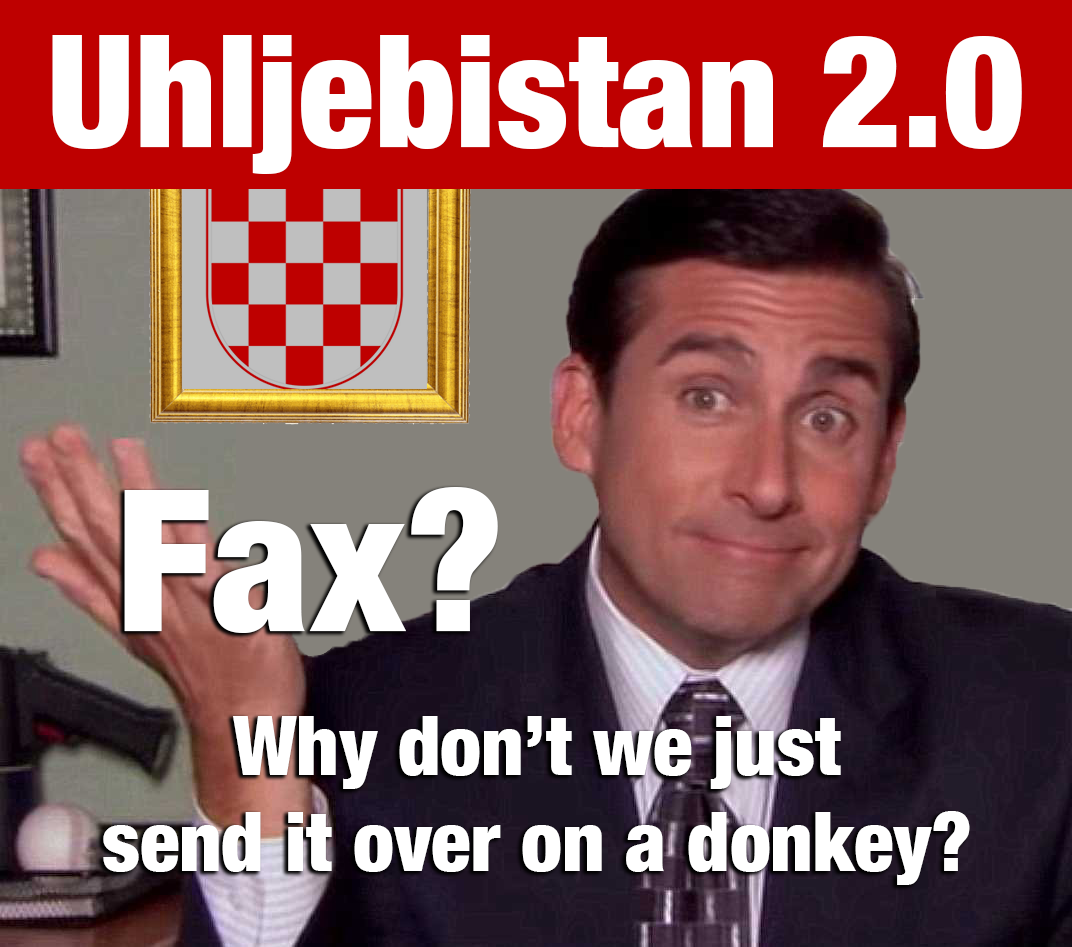
Počeo sam se pitati je li problem u meni, pa sam pitao svoje prijatelje na Facebooku da podijele svoja iskustva. Postavio sam im tri pitanja (možete vidjeti cijeli razgovor - moj profil na Facebooku je javan).
1. Jeste li u posljednjih 12 mjeseci primili ili poslali faks?
2. Ako niste, kada ste to otprilike posljednji put učinili?
3. A za mlađe među nama, jeste li ikad koristili faks?
Rezultati su bili veoma zabavni, svih 77 komentara koje sam dobio do sada, i iznenadila me strast iznešena u odgovorima.
I čini se, osim nekih banaka, JEDINI put kad ljudi koriste faks je kad moraju komunicirati s Moćnom Državom Uhljebistanom.
Jedan od najdražih komentara mi je ostavio Jason u Splitu, čija punica je pronašla dobru svrhu za svoj faks-uređaj: služi kao ukras.
I zamislite se malo nad mladom Mihaelom, koja sa svojih 23 godine ne samo da nikad nije koristila faks, nego nije niti sigurna kako on zapravo izgleda. Provjerio sam i sa stažisticom koja za TCN upravlja društvenim mrežama (i vrlo je učinkovita u tome) i u njenih 20 godina u Prelijepoj Hrvatskoj ni ona nijednom nije slala niti primala faks.
Dakle, čini se da većina stanovnika Moćne Države Uhljebistan nije opremljena za uporabu ove tehnologije, nego biraju koristiti se nečim što se naziva e-mail, SMS i društvene mreže.
Što da sad radimo? Da upišemo cjelokupnu populaciju u masovni program osposobljavanja o tome kako se koristiti uređajem za slanje faksova?
Ili možda, samo možda, da potaknemo digitalne šampione koji upravljaju ovom zemljom da shvate da je predsjedanje Europskom unijom u 2020. korištenjem faks uređaja tako... kao iz 1980-ih.
Za najnovije progresivne vijesti iz Moćne Države Uhljebistana,
For the latest progressive developments from the Mighty State of Uhljebistan, pratite naše objave koje se tiču te Obećane Zemlje.

